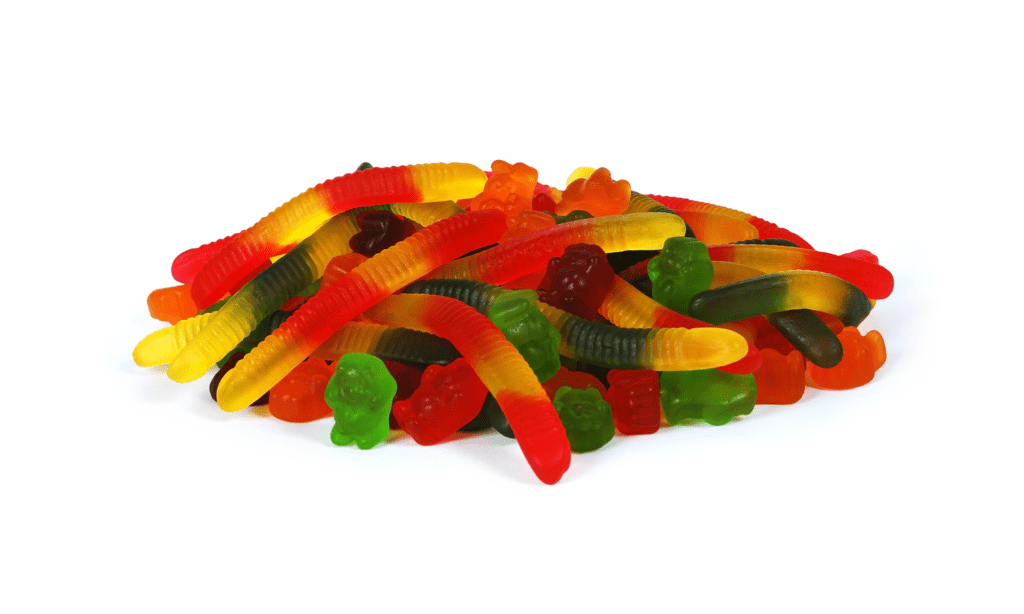*This page may include affiliate links, which means that if you make a purchase through one of the product links, we may receive a small commission. For full affiliate disclosure please see our disclaimer page.
Are you a dog owner who’s snacked on gummy worms and wondered “Can dogs have gummy worms”? Well, you’re not alone! As dog owners, we often want to share our favorite treats with our beloved pets. However, it’s essential to understand what’s safe for them to consume and what could potentially be harmful. In this blog, we will delve into the world of gummy worms and explore whether dogs can have them and if they pose any risks to their health. We’ll also discuss key factors to consider when giving treats to our canine pals.

Gummy Worms: What Are They?
Gummy worms are a popular candy made from a combination of sugar, gelatin, water, and various flavorings. These chewy, colorful treats come in a variety of shapes, sizes, and flavors, making them a favorite among children and adults alike. Some gummy worms contain all-natural ingredients, while others may include artificial flavors, colors, and sweeteners.
The wide array of gummy worms available in the market caters to different likes, from classic fruit flavors to sour and tangy arrays. Some brands even offer vegan gummy worms that substitute gelatin with plant-based alternatives like agar-agar or pectin.
When it comes to our furry friends, the main concerns with gummy worms are their sugar content, artificial sweeteners, and other potentially harmful substances. In the following sections, we’ll discuss each of these concerns in detail and explain why gummy worms might not be the best treat for our canine companions.
Sugar and Dogs: A Problematic Pair
Just like humans, dogs require a balanced diet to maintain optimal health. This diet should consist of proteins, fats, carbs, vitamins, and minerals in the right proportions. While dogs can safely consume small amounts of sugar, excessive sugar intake can lead to various health issues.
Consuming too much sugar can negatively impact a dog’s health in several ways:
- Weight gain and obesity: Excess sugar adds extra calories to a dog’s diet, which can lead to weight gain and obesity. Overweight dogs face an increased risk of various health problems, including heart disease, joint issues, and a reduced lifespan.
- Dental issues: Sugary treats like gummy worms can contribute to plaque buildup and tooth decay in dogs. Poor dental hygiene may cause gum disease, tooth loss, and bad breath.
- Diabetes: Consistently high sugar intake can put a strain on a dog’s pancreas, possibly leading to diabetes. This chronic condition requires lifelong management and can result in further health complications if left untreated.
As a responsible pet parent, it’s important to monitor your dog’s sugar intake and limit it to a safe amount. Generally, sugar should not make up more than 5% of a dog’s daily caloric intake. Always check the labels of treats and food items for added sugars. Consider opting for healthier alternatives to keep your dog happy and healthy.

Beware of Artificial Sweeteners
Many gummy worms and other candies contain artificial sweeteners to enhance their flavor without adding extra calories. Common artificial sweeteners include aspartame, sucralose, and saccharin. However, one particular sweetener, xylitol, is highly toxic to dogs and poses significant risks to their health.
Xylitol is a sugar substitute often found in sugar-free products, such as gum, candy, and baked goods. While it is safe for human consumption, xylitol can be extremely dangerous for dogs. This is due to its ability to rapidly release insulin, causing a rapid decrease in blood sugar levels. The consequences of xylitol ingestion in dogs can be severe and even fatal:
- Hypoglycemia: Ingesting xylitol can lead to a sudden drop in blood sugar levels (hypoglycemia) within 30 minutes to an hour. Symptoms of hypoglycemia in dogs include vomiting, loss of coordination, lethargy, seizures, and even coma.
- Liver failure: Xylitol can cause acute liver failure in dogs, which can be life-threatening. Signs of liver failure include jaundice (yellowing of the skin and eyes), vomiting, diarrhea, and swollen abdomen.
- Death: In severe cases, xylitol poisoning can lead to death, especially if not treated promptly.
If you suspect your dog has ingested a product containing xylitol, it’s crucial to seek veterinary care immediately. Early intervention can significantly improve your dog’s chances of recovery. To prevent accidental xylitol ingestion, always keep products containing this sweetener out of your dog’s reach. Double-check the ingredients list on any treats or snacks before sharing them with your furry friend.
Harmful Substances to Avoid
In addition to sugar and artificial sweeteners, gummy worms may contain other ingredients that could be harmful to dogs. As a responsible pet owner, it’s essential to be aware of these substances.
- Artificial colors: Many gummy worms are brightly colored using artificial food dyes, such as Red 40, Yellow 5, and Blue 1. While these colorings are generally recognized as safe for human consumption, they can cause adverse reactions in some dogs. Allergic reactions may include skin irritations, gastrointestinal upset, or hyperactivity. To minimize the risk of an allergic reaction, opt for treats made with natural colorings or avoid colored treats altogether.
- Preservatives and additives: Gummy worms and other processed treats may contain chemical preservatives, such as sodium benzoate or potassium sorbate, and additives like glycerin or corn syrup. Some dogs may be sensitive or allergic to these ingredients, leading to gastrointestinal issues, skin irritations, or other health problems. Always read the label of any treat you plan to give your dog. Choose products made with minimal preservatives and additives to reduce the risk of adverse reactions.
By being vigilant about the ingredients you offer your dog, you can help ensure their safety and overall well-being. When in doubt, consult with your vet for guidance on selecting the most suitable treats for your furry companion.

Try Safe Alternatives for Dog Treats
Instead of giving your dog gummy worms or other potentially harmful human treats, consider providing them with safer, dog-friendly alternatives. These options will not only satisfy your dog’s cravings but also contribute positively to their health and well-being.
- Natural, dog-friendly treats: There are numerous commercially available treats specifically formulated for dogs. Look for options made with natural ingredients, such as pure meat treats, dehydrated fruits or veggies, and dental chews designed to help clean your dog’s teeth. Always choose treats appropriate for your dog’s size and chewing habits to lessen the risk of choking or digestive issues.
- Homemade dog treat recipes: Making your own dog treats at home allows you to control the ingredients and ensure they are safe for your canine companion. There are countless homemade dog treat recipes available online, ranging from simple peanut butter cookies to nutritious veggie snacks. Just remember to avoid ingredients that are toxic to dogs, such as chocolate, grapes, onions, and garlic.
A Recipe to Try
Wholesome Peanut Butter & Pumpkin Dog Treats
Ingredients:
- 1 1/2 cups whole wheat flour (feel free to swap with gluten-free flour if your dog has a sensitivity)
- 1/2 cup canned pumpkin puree (just the plain pumpkin, not the pumpkin pie filling)
- 1/4 cup natural, unsweetened peanut butter (make sure it doesn’t contain xylitol)
- 1 large egg
- 1/2 teaspoon ground cinnamon (optional, but it adds a nice touch)
Instructions:
- Start by preheating your oven to 350°F (175°C) and lining a baking sheet with parchment paper or a silicone baking mat.
- Grab a large mixing bowl and combine the pumpkin puree, peanut butter, and egg. Give it a good mix until everything is smooth and nicely blended.
- Now it’s time to add the whole wheat flour and cinnamon (if using) to your pumpkin mixture. Keep mixing until your dough comes together and isn’t sticky anymore. You might need to adjust the flour a bit, depending on how your dough feels.
- Lightly flour your working surface and roll out the dough to about 1/4-inch thickness. Get creative with your favorite cookie cutter shapes (bones, hearts, stars, you name it) and cut out your doggy treats. Place them on the prepared baking sheet.
- Pop the treats in the oven for 20-25 minutes or until they turn golden brown and are firm when you touch them. The exact baking time might vary, depending on the size and thickness of your treats.
- Once they’re done, take them out of the oven and let them cool completely on a wire rack.
To store the treats, keep them in an airtight container at room temperature for up to a week, or in the fridge for a couple of weeks. You can even freeze them for up to 3 months and thaw them whenever your dog needs a special snack.

Conclusion
While gummy worms might be a tempting treat to share with our dogs, they’re not the best choice. The high sugar content, potential presence of harmful artificial sweeteners like xylitol, and other substances make them unsuitable for dogs. Instead, opt for healthier alternatives like natural dog treats or homemade recipes that cater to your pet’s specific dietary needs.
Remember, moderation and portion control are essential when offering treats to your dog. It’s always a good idea to consult your veterinarian for personalized advice on your dog’s diet and nutrition. By making informed choices and prioritizing your dog’s health, you can build a strong bond with your canine companion.
~ Sheena
